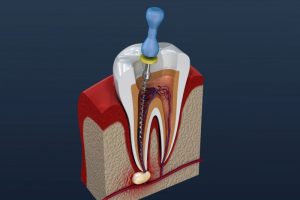
You’ve had a steady pain in your molar for weeks now. You thought it might get better if you left it alone, but it has actually worsened. You told your dentist, who then scheduled you for a root canal. You’ve heard all the horrible rumors about root canals in Burlington, and you’re unsure of whether you want to go through with it. But just how dangerous are root canals? Let’s take a closer look.
What Is a Root Canal?
In the old days, extraction was the only option for a severely damaged, decayed, or infected tooth. Thanks to root canals, your dentist in Burlington can preserve the tooth for years to come. During the procedure, your dentist will numb your tooth with local anesthetic, remove the damaged areas from the center of the tooth, disinfect it, and then seal up with tooth. Oftentimes, a filling or crown is then placed on top, as the tooth becomes fragile after a root canal.
Misinformation About Potential Root Canal Dangers
According to the American Association of Endodontists (experts on root canals), the origin of much of the fear surrounding root canals dates back to poorly conducted research from the early 20th century. Even though the Internet continues to perpetuate much of this misinformation, dentists and endodontists have taken steps to debunk these myths. For example, root canals are rumored to be painful, but thanks to local anesthetic, they are no more uncomfortable than getting a filling.
Rare Root Canal Complications
All medical and dental procedures have risks involved, and root canals are no exception. Here are a few examples of rare complications that can develop from root canal therapy:
Bacteria Remaining
Sometimes, bacteria can linger within a tooth that has received a root canal, usually near the tip of the root where it’s difficult for your dentist’s tools to reach. This is why many patients are frequently prescribed a round of antibiotics to curb potential infection.
Inadequate Filling
Your root canal may fail if the canals of your tooth have been overfilled or underfilled with sealant material.
Improper Sealing
The purpose of the restoration placed over the tooth treated with a root canal is to not only protect it, but prevent bacteria from reentering and causing problems. Your filling or crown should be enough to keep out bacteria.
Untreated Canals
Sometimes a tooth has more canals than roots, and they can be hard for your dentist to find. It may cause complications such as reinfection if your dentist misses a canal.
Broken Instruments
Root canal therapy entails using very fine instruments to clean out a tooth. Occasionally, a part of these instruments can break off within the tooth and can compromise the success of a root canal.
Despite the risk of these complications, root canal therapy remains one of the safest and most successful dental treatments available to treat a diseased or damaged tooth. If you still have concerns, your dentist should be able to reassure you that everything will very likely be fine.
About the Author
Dr. James Kostas has been working in dentistry for almost three decades, since graduating from Tufts University’s School of Dental Medicine. He has achieved Fellowship status in both the Academy of General Dentistry and the American Dental Implant Association. He is also more than capable of performing root canals in Burlington to help soothe your toothache. To learn more, you can contact Dr. Kostas’ office at (781) 272-0441.







